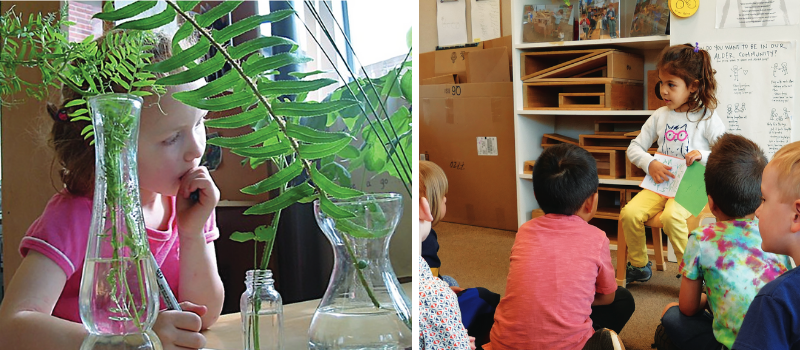
by Susan Harris MacKay, author of Story Workshop: New Possibilities for Young Writers:
Story workshop started with a question embraced by teacher-researchers at Opal School, including me and my colleagues. We asked: What is the connection between literacy and the arts? Inspired and curious about the rich landscape we expected to find around this intersection, we asked more questions:
- What might be the role of play?
- What happens when we infuse writing workshop with ample use of the arts and time to play?
- How do the voice and the choice that result when we invite children to create and tell their stories lead a classroom to practice the habits of healthy democracy?
- How does this practice, as a first priority, both rely on and reinforce equity and access for all?
Story workshop invites teachers who understand that children learn best through play, but struggle to find a place for it, to infuse it right into literacy instructional time—and they are seeing the explosion of motivation and engagement that happens when they do. Story workshop helps teachers who have practiced writing workshop for a long time, but have been challenged by those students who say they never have anything to write about, find out that all children have stories to tell.

Story workshop allows teachers who lament the loss of the arts in the child’s school day to find a way to put them to use in new ways that work for everyone.
As schools are transitioning between virtual and in person instruction, story workshop is a powerful way to fuse social emotional learning, community building, and vigorous literacy instruction during a time when teachers are not going to be able to afford to compartmentalize those things. Children need to share their experiences, their emotional lives, and to find their way back to one another and to school, and story workshop is designed to joyfully facilitate that.
How Does Story Workshop Work?
Story Workshop is a structure and approach that supports language and literacy development in the preschool and primary grades. Adults work alongside children as they explore prepared environments and experiences and share stories. Together they wonder:
- Where do stories live?
- What stories do I want the world to hear?
- What stories do I need to tell?
- How do stories influence me and our community?
- How do my stories become part of my community, and how do the stories of others in my community become a part of me?
At Opal School, story workshop takes place four or five days a week and lasts up to ninety minutes. Teachers in other schools have developed their own rhythms of story workshop that work for them in their unique settings. 
In every story workshop, adults invite children to imagine, write, edit, revise, publish, and share their stories. Prepared spaces and organized materials inspire and entice children to overflow with thoughts and ideas and memories and imagination. Materials like blocks, paint, water, sand, colored pencils, and loose-parts collage become the vehicles for the children’s stories and act as inspiration as they capture them on paper as increasingly skilled writers. Adults facilitate children to engage as a thought community, listening to one another’s stories and considering their influence on their lives and in their classroom. They construct meaning together as they make sense of the world they experience together.
What Are the Structures and Routines of Story Workshop?
There are five elements that make up the structure of story workshop:
- Preparation happens prior to the children’s arrival. It includes organizing materials and environments specifically designed to support both the children’s story creation and the teacher’s research.
- Provocation is the whole-group session that begins each story workshop. It includes a proposal the teacher introduces to the children to engage, sustain, and extend their interests and curiosity.
- Invitation and negotiation is the transition between provocation and creation. It is intended to support each child with a plan to get started.
- Story creation makes up the bulk of a session of story workshop. It is a time for using the arts and play as well as writing to make meaning, to imagine, to create, and to share stories.
- Story sharing brings closure to story workshop each day. It is a time for building community through story and reflection.
 The organizational structure is sequential, but I encourage you to dive in anywhere that you feel most comfortable. The element of the structure you are most curious about and in which you can find the most connections to your current work would be a good place to take beginning steps into the theory and practice of story workshop. Give yourself time, and observe your students, who will have plenty to teach you!
The organizational structure is sequential, but I encourage you to dive in anywhere that you feel most comfortable. The element of the structure you are most curious about and in which you can find the most connections to your current work would be a good place to take beginning steps into the theory and practice of story workshop. Give yourself time, and observe your students, who will have plenty to teach you!
To learn more about Story Workshop visit Heinemann.com.

A teacher for 25 years, Susan Harris MacKay most recently served as Pedagogical Director at Opal School in Portland, Oregon, where the idea of story workshop began in her classroom. As a national speaker, she has inspired thousands of teachers to expand their use of play, the arts, and inquiry to support children’s rights to high quality educational environments upon which our democracy depends.




